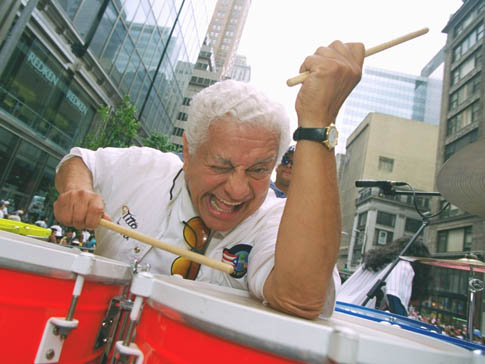BY MAITE JUNCO
DAILY NEWS STAFF WRITER
Joe Conzo knew el maestro Tito Puente well beyond the bright smile and stirring showmanship.
For almost 40 years, Conzo was a close friend, publicist and chronicler of “El Rey,” the pioneering musician who rose to the beat of mambo from the streets of East Harlem to international fame.
But Conzo, 68, also knew what he calls “the very private” Puente, the one who did drugs, liked the ladies a bit too much and was a serious follower of the Santería religion.
Conzo shares with gusto and abundant anecdotes the life and legacy of the legendary six-time Grammy winner in his recently released book, “Mambo Diablo: My Journey with Tito Puente,” written with journalist David A. Pérez.
An East Harlem-native who now lives in Warwick, Orange County, Conzo will sign copies of the tome on Monday, Feb. 14, at a music-filled event at the Harbor Conservatory, 1 E. 104th St. at Fifth Ave., at 7 p.m. Bandleaders Louis Bauzó and José Madera Jr. will perform.
When did you first meet Tito Puente?
In 1959, I met him in the Palladium. Then I met him again in Japan on my way to Korea in 1960. The war had finished but I was going to Korea. [Cuban bandleader] Machito was the first [Latin] orchestra to play in Japan, followed by Tito Puente. We said hello; he didn’t remember my name, but it was a matter of destiny. His widow, Margie, and I grew up together, and his older son, Ronnie, went to school with my sister. For me, it was destiny. … In the mid to late ’60s I started getting closer to Tito, after I got off drugs.
Can you sum up his importance to Latin music?
Tito Puente opened the door to everyone, whether it was Puerto Rican, Cuban, whatever. [Bandleader] Mario Bauzá, Paquito D’Rivera, they said it: If it wasn’t for Tito Puente, we don’t know where our music would be. … Before the Fania All-Stars, before Gloria Estefan, Tito was already playing in Europe.
Have people forgotten about him?
Hispanics don’t know about their culture. If you ask kids, particularly those born here, ‘Who is Tito Rodríguez? Who is Machito? Who is Daniel Santos?’ They don’t know. ‘Who is Rafael Hernández?’ And you don’t have to go that far. Ask who is José Feliciano and they look at you, ‘Who?’ You know what I tell young people who don’t know Tito Puente. … Have you seen theNissan commercial, the one with a man in one car and a woman in the other, that starts, “Oye como va …”? And they say, ‘Oh, yeah, yeah, yeah, I know that song.’ And I say, he wrote it.
Why the title “Mambo Diablo” (“Mambo Devil”)?
That is my favorite tune by Tito Puente from the Palladium. He played the vibraphone, not only the timbales. And that number starts like this [he breaks into the beat]. It’s the most beautiful thing.
In the recently staged show “They Call Me La Lupe,” starring Lauren Vélez, the Cuban singer is romantically involved with Tito Puente in the 1970s. What is your take?
It never happened.
But Tito Puente had many women around, or as you say in the acknowledgments, “his romantic interludes are legendary.”
He was a womanizer; most men in that business are womanizers, except me, that’s why I’ve been married six times. [Laughs.] You know what I did? [Puente’s widow] Margie said, “I will be very grateful if you don’t mention names.” And I didn’t mention names. Out of respect.
You write that he “used cocaine” and that “there were always friends, fans and musicians with a ready supply of the powder.”
That was part of the scene. In the ’60s, the ’70s, the ’80s cocaine was everywhere. But I don’t dwell on it. … Tito wasn’t a drug addict, it was an occasional thing that he did. … I had a problem with drugs [heroin], like [singers] Cheo [Feliciano] and Ismael Rivera. I bring it out [in the book] to show Tito in a different light, because he never rejected me. Neither him, nor Machito. They never turned their backs on me. On the contrary. … What I’m trying to accomplish with the book is to show that as a human being he had his faults but he also was a genius.
You mention that Puente became a santero, a priest in the Santería religion. But you don’t go into details about the process.
I respected him in life and also in death. I used to tell people who were going to interview him, don’t ask him about his private life – or religion. He was very private about that.
What make this book different from others?
I was there. No one told me about Tito. I was there. For example, I was in Florida when Machito died. Tito sent for me. … When we saw Machito in the casket, he broke down. He held the cadaver. I had to tell him, “Put him down. He’s gone, Pops.” I called him Pops. He pushed Margie, [and told her] leave me alone. I was to his right. To this day I can still see it. “Put him down,” then very strongly, “Bájalo.” “Tito, put him down. Pops, put him down.” Then he realized it.





